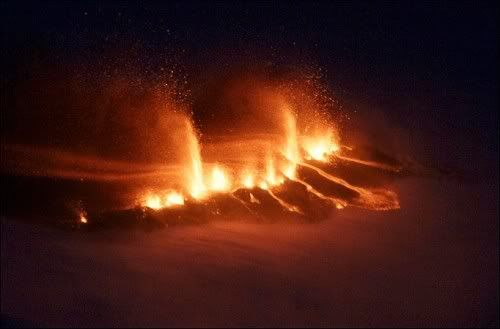I think this could be a wake up call, we are more dependent than we realise on a vulnerable supply chain. Thanks to peak oil and climate change in the long term flying on this scale is not sustainable. We must think about how we will feed our country in the future. This eruption may do what hurricane Katrina did, make us aware that we are not more powerful than nature.
The volcano under the Eyjafjallajokull glacier erupted continuously for about six months in 1823, University of Melbourne earth sciences Associate Professor David Phillips said.

Iceland’s Laki volcano erupted in 1783, freeing gases that turned into smog. The smog floated across the Jet Stream, changing weather patterns. Many died from gas poisoning in the British Isles. Crop production fell in western Europe. Famine spread.
One of the toughest things for people to do is to anticipate sudden change. Typically we project the future by extrapolating from trends in the past.
For most of us, the idea that civilization itself could disintegrate probably seems preposterous. Who would not find it hard to think seriously about such a complete departure from what we expect of ordinary life? What evidence could make us heed a warning so dire—and how would we go about responding to it? Sure, our civilization might devolve into chaos—and Earth might collide with an asteroid, too!
Europe has not seen such travel disruption for decades. Air space across from Britain to Ukraine was closed and set to stay that way until Sunday or Monday in some countries. Millions of passengers have had plans foiled or delayed. Airlines are losing millions every day.
Christopher Snelling, the FTA's head of global supply chain policy, said: "The longer that UK airspace is closed for business, the greater the damage, not just to businesses here, but also for farmers in the developing countries who rely on exporting their produce to Europe."
Alan Braithwaite, chairman of LCP Consulting, a supply chain specialist, said: "The disruption to UK and EU aviation from the Icelandic dust cloud will lead to shortages of product quite quickly for categories like fresh fruit and flowers and then into the pharmaceuticals and high-tech areas based on limited stock in the chain." I am less worried about flower shortages though.
A spokesman for Tesco said: "Less than 1pc of what we sell comes into the UK via air. At the moment there is no impact and we have enough stock. We are keeping a very close eye in it at the moment."
An Asda spokesman said: "We don't have much of a problem. Where we do import fruit by air it tends to be exotic fruit. We have a good stock at the moment."
Around the world, anxious passengers have told stories of missed weddings, business deals and holidays because of the ominous plume. Stranded passengers reported the delays were causing financial hardships. Some had to check out of hotels and sleep in airports.
"It's like a refugee camp," said Rhiannon Thomas, of Birmingham, describing the scene at New York's Kennedy Airport. Her family spent the night at the airport Friday, and may be there for days before they can get a flight home. "At least we got beds," said Thomas' mother, Pat, referring to the hundreds of narrow blue cots brought in to JFK's Terminal 4. "Some people slept on cardboard."
German Chancellor Angela Merkel was heading homeward in an armored car along an Italian highway Saturday — continuing a long and circuitous return from the United States.






3 comments:
Even during the heavy snow this year we all realised just how vulnerable we were to nature.
The problem appears to be that most people feel it's their right or "normal" that they should travel 500 miles or 5000 miles in one day, when in fact that's an incredible distance to go.
It's only in the past 100 years or so of human's existence where we've been able to do that.
Good points.
Theres some other worrying things; the bees dying (colony collapse).
I agree with GreenGabbles (great name!) and Adrian.
I can't believe how little time/info the media give to the real, more important things - other than just missing - yes I agree thousands of holidays - flights. How ever we (mankind) thinks we big and fabulous at, Mother Nature is doing always ready to give us a big hard shock.
Mark L
Post a Comment